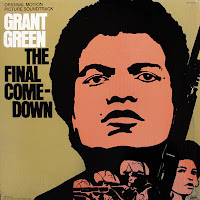Grant Green - The Final Comedown
Released - 1972
Recording and Session Information
A&R Studios, NYC, afternoon, December 13, 1971
Irving Markowitz, Marvin Stamm, trumpet, flugelhorn; Phil Bodner, flute, piccolo, alto sax, oboe; Harold Vick, alto, tenor sax; Julian Barber, Harry Zaratzian, viola; Seymour Barab, Charles McCracken, cello; Eugene Bianco, harp; Warren Smith, marimba, tambourine; George Devens, vibes, timpani, timbales, percussion; Richard Tee, piano, organ; Cornell Dupree, Grant Green, guitar; Gordon Edwards, electric bass; Grady Tate, drums; Ralph MacDonald, congas, bongos; Wade Marcus, composer, conductor.
9061 Past, Present And Future
9064 Fountain Scene
9065 Soul Food-African Shop
9066 Slight Fear And Terror
9068 Luanna's Theme
A&R Studios, NYC, night, December 13, 1971
Irving Markowitz, Marvin Stamm, trumpet, flugelhorn; Phil Bodner, flute, piccolo, alto sax, oboe; Harold Vick, alto, tenor sax; Julian Barber, Harry Zaratzian, viola; Seymour Barab, Charles McCracken, cello; Eugene Bianco, harp; George Devens, vibes, timpani, timbales, percussion; Richard Tee, piano, organ; Cornell Dupree, Grant Green, guitar; Gordon Edwards, electric bass; Grady Tate, drums; Ralph MacDonald, congas, bongos; Wade Marcus, composer, conductor.
9062 The Final Comedown
9067 Afro Party
9070 Traveling To Get To Doc
9071 One Second After Death
A&R Studios, NYC, afternoon, December 14, 1971
Burt Collins, Marvin Stamm, trumpet, flugelhorn; Romeo Penque, flute, alto sax; Harold Vick, alto, tenor sax; Julian Barber, Harry Zaratzian, viola; Seymour Barab, Charles McCracken, cello; Eugene Bianco, harp; Warren Smith, marimba, tambourine; George Devens, vibes, timpani, timbales, percussion; Richard Tee, piano, organ; Cornell Dupree, Grant Green, guitar; Gordon Edwards, electric bass; Bernard Purdie, drums; Ralph MacDonald, congas, bongos; Wade Marcus, composer, conductor.
9063 Father's Lament
A&R Studios, NYC, night, December 14, 1971
Track Listing
| Side One | ||
| Title | Author | Recording Date |
| Past, Present and Future | Wade Marcus | December 13 1971 |
| The Final Comedown | Wade Marcus | December 13 1971 |
| Father's Lament | Wade Marcus | December 14 1971 |
| Fountain Scene | Wade Marcus | December 13 1971 |
| Soul Food, African Shop | Wade Marcus | December 13 1971 |
| Slight Fear and Terror | Wade Marcus | December 13 1971 |
| Side Two | ||
| Afro Party | Wade Marcus | December 13 1971 |
| Luanna's Theme | Wade Marcus | December 13 1971 |
| Battle Scene | Wade Marcus | December 14 1971 |
| Traveling to Get to Doc | Wade Marcus | December 13 1971 |
| One Second After Death | Wade Marcus | December 13 1971 |
Liner Notes
"The Final Comedown" is a story of anger. It could happen any time. It is the tale of a young blackman, Johnny Johnson, and the classic tragedy of his final comedown. "Bitter, baby," says Johnny. "I'm not bitter, I was bitter 350 years ago. I'm violent! Hear me, violent!"
Writer-Producer-Director Oscar Williams sees the film as symbolic of the feelings of so many men in America. The problem is real, Williams feels, and perhaps by exposing it on film, we may learn to deal with it before we have the final comedown. The film stars Billy Dee Williams, D'Urville Martin, Celia Kaye and special guest star Raymond St. Jacques.
The music is a most expressive aspect of the movie. It was dramatically written to express the electricity of the story. It is the first film score for Wade Marcus and also a first for Grant Green, who is well-know in the music world. Wade, producer George Butler and Grant Green went into the recording studio and emerged with one of the heaviest soundtracks ever recorded, music which turns out to be a very vital part of the picture. It had to be heavy; it is the first on the Blue Note label and the beginning of a new era in motion picture sound.
Dig It!
Alan Shulman, cello; replaces McCracken.
9069 Battle Scene (The Battle)



No comments:
Post a Comment